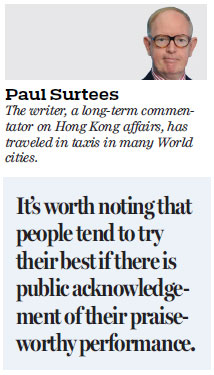- Home > News > Domestic News
- domestic news
Multi-pronged approach needed to improve taxi service
Hong Kong's traveling public is well-served by taxis; there are plenty of them (more than 18,000) and the correct fares are reasonably cheap. The recent introduction of an Octopus card payment option is a welcome step. Certainly, many drivers provide excellent service to passengers; while regrettably a significant minority don't. The government's Committee on Taxi Service Quality has proposed a raft of new approaches, aimed at improving the behavior of offending cabbies. These proposals are presently under review by the trade, and the general public, and will likely be put to the Legislative Council at some point next year.
Generations of the traveling public in Hong Kong have suffered the all-too-common experience of receiving poor customer service from taxi drivers.
Our MTR system, for example, is the envy of many other world cities. Generally, levels of customer service on these other forms of public transport are pretty high, so it is all the more unfortunate that some of Hong Kong's taxi drivers act discourteously or even dishonestly toward customers, thereby giving a poor impression to visitors and irritating locals.

It is proposed to set up a demerit points system, whereby any offending taxi drivers build up "black marks" for each offense. Having more than a very-limited number of demerit points on their record over a two-year period could result in temporary suspension. However, as so often with proposed legislation, its intended deterrent effect depends largely on the chances of being caught, as well as the seriousness of punishment imposed. Here, detailed proposals have some way to go to achieve their desired effect of improving drivers' behavior.
Clearly, some offenses are worse than others. They range from smoking at the wheel to declining to give change for a HK$100 bill presented in payment of the fare; to refusing to use the meter (a common offense late at night, in a typhoon, or after big public events); to declining to take the passenger at all; to passing counterfeit bank notes; to driving too fast; to jumping red lights. Then there are the passive turnoffs - the dirty state of the taxi interior and the residual odious stale cigarette smoke that permeates the passenger compartment.
Some of these offenses could be handled by traffic police - if they can catch them! The number of demerit points recorded per offense would properly be graded, according to the seriousness of the offense. The Transport and Housing Bureau understands the need to introduce stricter penalties, for their deterrent effect. Nobody is suggesting a cabbie should be imprisoned for failing to provide small change but a graded system of suspensions would seem fairer. Under such a system, suspensions of one day, one week, one month, three months and so on would be imposed depending on the aggregate demerit points built up, and paying due attention to the nature of the actual offenses committed.
Michael Tien Puk-sun, a committee member, has rightly noted that the universal and compulsory use of in-cab CCTV (accessed only by police, for privacy reasons) would go a long way toward achieving behavior improvement - and providing evidence if any offenses are committed. Without this, many offenses would go unreported or unproven, thus negating the intended effects of these proposals. Having a strong chance of being caught, and of being firmly punished for wrongdoing, are both essential elements if any real improvements are to be achieved by these proposed changes. Having plain-clothed inspectors take taxi rides incognito would also increase the chances of wrongdoers being caught.
But not all unpleasant common aspects of riding a taxi in Hong Kong may be described as offenses, though they certainly do serve to sour the experience of too many taxi journeys. For example, the drivers who deliberately ignore a customer who is struggling to load luggage into the trunk, without helping. Or the driver who remains completely silent when the requested destination is stated, in Cantonese or English - leaving the passenger unsure if the silent driver has heard, or even knows the place wanted. Or demanding the fare rudely; or indeed the very few who say thank you, in either language, even when a tip is added to the metered fare.
These are all matters of discourtesy; all are widespread. No system of addressing actual offenses can do much to improve matters here. Rather, developing a better sense of customer service - by introducing annual compulsory customer service retraining - would be a welcome addition to the present proposals. The two approaches combined should serve to greatly enhance the passenger experience in Hong Kong taxis.
Finally, to take this a step further, how about having the Transport Department and the Hong Kong Tourism Board jointly organize an annual "Best Taxi Driver Competition" taking into account the driver's courtesy, professionalism and honesty. It's worth noting that people tend to try their best if there is public acknowledgement of their praiseworthy performance.
- Previous:The clutching arm of the law
- Next:CEOs pledge to stub out smoking
| Chinese Association on Tobacco Control Copyright © 1992-2011 906-907 Anhuidongli, Chaoyang District Beijing 100101 |